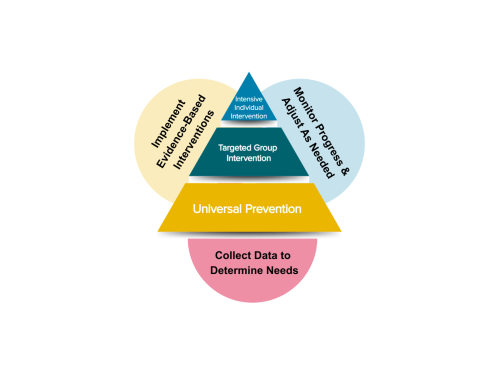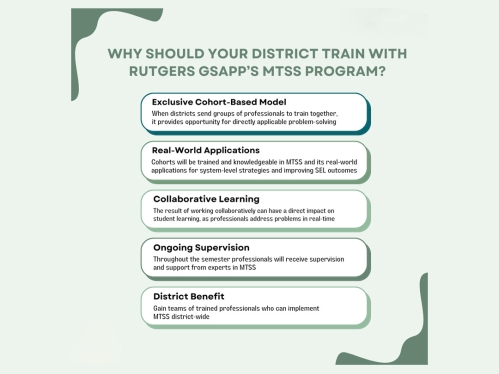
Multi-Tiered Systems of Support (MTSS)
The Rutgers Graduate School of Applied and Professional Psychology (GSAPP), in collaboration with the Graduate School of Education (GSE), led the development of a series of courses dedicated to translating leading-edge science into effective implementation of MTSS in K-12 settings.
MTSS Spring Webinar Series
Join our faculty for four FREE, one-hour webinars on practical, evidence-based strategies for implementing MTSS!
What is MTSS?
Pioneered by scholars in education and school psychology, Multi-Tiered Systems of Support (MTSS) is a framework for providing comprehensive academic and behavioral health services for K-12 students. Use of this framework has been strongly advocated by school systems, policymakers, and researchers at the state and national levels. To effectively implement MTSS, school districts may need to provide more comprehensive school-wide programming that requires additional professional development to build or expand their efforts. Training in MTSS Is more essential than ever for Teachers, Academic Coaches, Instructional Leaders, School Counselors, School Psychologists, Child Study Team Members and Administrators to address the ongoing academic and behavior health needs of students.
Why MTSS?
Now, more than ever, students approach school with vastly different learning, social emotional, and behavioral needs. Teachers, specialists, and other professionals in school settings need knowledge and tools to help them identify students’ learning and social emotional needs to implement evidence-based practices that are closely linked to those needs.
MTSS Enables:
- Rapid, strategic identification of student needs
- Matching intensity of interventions to the level of student need
- Ongoing progress monitoring
- Data-driven decision-making
- Equitable intervention access for ALL students
Benefits by Role:
- Educators and Specialists:
- Become an expert in tiered supports, data-driven decision-making, and progress monitoring. Strengthen student engagement, reduce behavior concerns, and support emotional health. Gain strategies for diverse learners, including ELLs and students with disabilities, with ongoing professional development.
- Counselors and Psychologists:
- Master tiered behavioral and social-emotional supports. Improve school climate, promote equity, reduce caseloads, and minimize unnecessary special education referrals.
- Administrators and Leaders:
- Lead MTSS implementation to boost academic performance and engagement. Prevent problems early, reduce discipline and special education referrals, improve attendance, and ensure equity across classrooms.

MTSS: A Framework for Improving the Delivery of Student Support Services
MTSS ensures all students get the right support at the right time. Build your skills in collecting and analyzing data to pinpoint needs, select evidence‑based interventions, make informed tier transitions, and close gaps between general and special education.
Intensive Individual Intervention
Includes individualized intensive instruction/intervention when students demonstrate the need for a higher level of support than previously offered. Students’ needs are highly specific and often require direct one-to-one support, frequent monitoring, and coordination across supports.
Targeted Group Intervention
Includes small group instruction/intervention when students demonstrate the need for support beyond prevention programming. Students are typically identified through a screening process to determine what additional support is needed.
Universal Prevention
Includes core instruction, social emotional learning, and school-wide positive behavior supports. All Tier 1, every student has access to schoolwide and classroom prevention programming.

Admissions and Coursework
GSAPP offers two convenient, fully online learning paths: an 18-credit certificate program and a 30-credit master’s degree in applied psychology focused exclusively on MTSS in school settings. These programs have been designed for current or future professionals in education (e.g., general or special educators, instructional leaders, administrators, counselors, psychologists, or other support professionals) who are looking to become change agents in their schools or districts.
Please Note: The MAP‑MTSS program is NOT a master’s degree in Applied Psychology, Counseling Psychology, or School Psychology.

Student Perspective
Have questions? We have answers. Watch this Q&A session facilitated by students in our School PsyD program for more information. Learn how MTSS can be the right fit for your professional career and school district!
Elevate Your District's Success
Discover the transformative power of Rutgers GSAPP's MTSS program! Empower your educators with cutting-edge strategies, personalized support, and evidence-based practices to foster student growth and well-being. Join us on the journey to excellence!

Former RU President, Jonathan Holloway, Supports MTSS Benefits and Collaboration
MTSS Certificate Course Sequence (18 Credits)
-
The purpose of this course is to provide students with an in-depth introduction to the foundational concepts and recent history of Multi-Tiered Systems of Support (MTSS) in primary and secondary school settings. Students will learn of the rationale behind and intend outcomes of multi-tiered systems of support in K-12 settings; how these systems are often organized and function; and critically, how schools begin the process of designing and implementing their own MTSS. Students will be exposed to topics of assessment, data-based decision making, and intervention strategies across contexts, as well as organizational strategies to promote implementation. Subsequent courses will cover each of these areas in greater depth and will provide opportunities for greater development of skill and expertise. By participating in this course, students will have the foundational knowledge required to begin help their school systems begin to evaluate the range of support currently available and identify future implementation needs.
-
The purpose of this course is to provide students with the foundational knowledge and applied skills required to engage in multiple forms of assessment used within MTSS frameworks, and to use data collected from such assessments to guide decision making and consultation at the individual and systems levels. This course will help students learn the basics of psychometrics, assessment (focused primarily on curriculum-based, or general outcome measurement), and will familiarize students with current best-practices in data-based decision making. It is expected that students completing this course will be able to translate findings from research into data practices that guide and improve support for all learners.
-
Successful implementation of MTSS often requires multiple forms of ongoing consultation by individuals with technical knowledge and skills in guiding others through a process of problem-solving and professional development. The purpose of this course is to build skills that will enable provision of consultation to enhance the quality of assessment, decision making, and intervention practices, and also to build upon developing skill in consultation around planning and initial implementation of MTSS.
-
One of the largest barriers to effective implementation of MTSS is knowing how to intervene, and with which interventions. Informed by the latest science, as well as field-based experience, this course has been designed to offer in-depth training on reading interventions for the elementary grades. Course participants will gain expertise in the science of learning to read, and in evidence-based reading intervention. Lessons will cover how to determine which students require intervention, the nature of each student’s skill-based needs, and how to use data to find interventions that target those needs.
NOTE: This course requires a weekly, virtual, one-hour synchronous learning session with the instructor.
-
The focus of this course is on the role of the inclusive classroom within the context of MTSS prevention models. The purpose is to prepare professionals to implement strategies in inclusive settings to promote school success, such as high-quality culturally-responsive instructional practices (i.e., best practice and motivationally engaging instructional strategies and evidence-based interventions) across the core content areas; high leverage practices to cultivate a positive inclusive classroom climate; methods of identifying students who are at-risk and curriculum-based measurement to monitor progress and adapt instruction and interventions effectively.
Note: Students must register for Dr. Judy Harrison’s section in the Graduate School of Education)
-
The focus of this course is on classroom and behavior management, delivered in the context of MTSS programming. Course content is drawn from a multidisciplinary research base, and covers a continuum, including working within a range of school environments that leverage an MTSS framework to varying degrees; establishing a positive and productive learning environment; building and facilitating positive relationships, proactive data-based assessment and management of behavioral issues.
Master of Applied Psychology (MAP) in MTSS Course Sequence (30 Credits)
-
The purpose of this course is to provide students with an in-depth introduction to the foundational concepts and recent history of Multi-Tiered Systems of Support (MTSS) in primary and secondary school settings. Students will learn of the rationale behind and intend outcomes of multi-tiered systems of support in K-12 settings; how these systems are often organized and function; and critically, how schools begin the process of designing and implementing their own MTSS. Students will be exposed to topics of assessment, data-based decision making, and intervention strategies across contexts, as well as organizational strategies to promote implementation. Subsequent courses will cover each of these areas in greater depth and will provide opportunities for greater development of skill and expertise. By participating in this course, students will have the foundational knowledge required to begin help their school systems begin to evaluate the range of support currently available and identify future implementation needs.
-
The purpose of this course is to provide students with the foundational knowledge and applied skills required to engage in multiple forms of assessment used within MTSS frameworks, and to use data collected from such assessments to guide decision making and consultation at the individual and systems levels. This course will help students learn the basics of psychometrics, assessment (focused primarily on curriculum-based, or general outcome measurement), and will familiarize students with current best-practices in data-based decision making. It is expected that students completing this course will be able to translate findings from research into data practices that guide and improve support for all learners.
-
Successful implementation of MTSS often requires multiple forms of ongoing consultation by individuals with technical knowledge and skills in guiding others through a process of problem-solving and professional development. The purpose of this course is to build skills that will enable provision of consultation to enhance the quality of assessment, decision making, and intervention practices, and also to build upon developing skill in consultation around planning and initial implementation of MTSS.
-
One of the largest barriers to effective implementation of MTSS is knowing how to intervene, and with which interventions. Informed by the latest science, as well as field-based experience, this course has been designed to offer in-depth training on reading interventions for the elementary grades. Course participants will gain expertise in the science of learning to read, and in evidence-based reading intervention. Lessons will cover how to determine which students require intervention, the nature of each student’s skill-based needs, and how to use data to find interventions that target those needs.
NOTE: This course requires a weekly, virtual, one-hour synchronous learning session with the instructor.
-
The focus of this course is on the role of the inclusive classroom within the context of MTSS prevention models. The purpose is to prepare professionals to implement strategies in inclusive settings to promote school success, such as high-quality culturally-responsive instructional practices (i.e., best practice and motivationally engaging instructional strategies and evidence-based interventions) across the core content areas; high leverage practices to cultivate a positive inclusive classroom climate; methods of identifying students who are at-risk and curriculum-based measurement to monitor progress and adapt instruction and interventions effectively.
Note: Students must register for Dr. Judy Harrison’s section in the Graduate School of Education)
-
The focus of this course is on classroom and behavior management, delivered in the context of MTSS programming. Course content is drawn from a multidisciplinary research base, and covers a continuum, including working within a range of school environments that leverage an MTSS framework to varying degrees; establishing a positive and productive learning environment; building and facilitating positive relationships, proactive data-based assessment and management of behavioral issues.
-
The purpose of this course is to provide students with the foundational knowledge and applied skills required to develop comprehensive school-based mental health (CSBMH) programs using a MTSS framework. This course will provide an overview of MTSS and facilitate students' understanding of key components of well-developed CSBMH programs. The course will highlight the importance of developing prevention and intervention programming focused on using social emotional learning to build evidence-based prevention and intervention programs. Readings and assignments will challenge students to explore issues of diversity, equity and inclusion and their influence on systemic change. Students will also begin to develop their understanding of school systems and the steps required to implement sustainable CSBMH programs. It is expected that students completing this course will be able to translate findings from research into implementation practices that guide and improve the delivery of mental health services.
-
The purpose of this course is for students to gain foundational knowledge of how children and youth develop knowledge and skill in numeracy, as well as methods schools can use to foster development of these skills in children who require intervention, and assessment strategies that inform intervention.
-
This course provides students with a comprehensive understanding of implementing a Multi-Tiered System of Support (MTSS) framework in secondary educational settings. It focuses on the unique complexities of secondary school structures and schoolwide practices, highlighting how MTSS implementation at the secondary level differs from elementary settings. Students will explore how tiered services are organized and function, as well as the initial steps in designing and executing MTSS for middle and high schools. Through this course, students will learn evidence-based strategies to address the academic, behavioral, and social-emotional needs of secondary students, emphasizing the development of systems that support all learners, including those at risk.
-
TBD
-
TBD
-
TBD
FAQs
-
MTSS Certificate:
- Bachelor’s degree (or advanced undergraduate), or higher degree in education, psychology, or related field
- Undergraduate and graduate transcripts
- Resume/CV
- Brief Personal Statement
Master of Applied Psychology-MTSS:
- Bachelor’s degree (or advanced undergraduate), or higher degree in education, psychology, or related field
- Undergraduate transcripts, demonstrating 3.0+ GPA; attach graduate transcripts if available
- Resume/CV
- Statement of Interest
- Two letters of recommendation
NOTE: Both programs require access to reliable internet
-
Applications for both the Certificate and Master’s programs are accepted on a rolling admissions schedule. However, we do recommend the following deadlines for each semester:
Master of Applied Psychology in MTSS:
Fall Admission:
- Applicants should plan to apply by August 1st
Spring Admission:
- Applicants should plan to apply by December 1st
Certificate in MTSS:
Fall Admission:
- Applicants should plan to apply by August 15st
Spring Admission:
- Applicants should plan to apply by December 15th
-
Yes, both programs offer classes in a fully online, asynchronous format. Students work to complete online learning activities and assignments on their own time within weekly deadlines.
-
The MTSS Certificate Program is 18-Credits, The Master of Applied Psychology in MTSS is 30-Credits
-
We recommend the following three courses in the sequence below first; the remaining courses can be taken in any sequence.
- Prevention and Intervention in Tiered System
- Assessment & Data-Based Decision-Making
- Systems & Behavioral Consultation
-
Most of the students completing the certificate take 1-2 courses per semester. Master’s students should plan on taking two courses per semester.
-
The difference between MTSS and RTI, is the scope of service. RTI focuses primarily on providing academic supports to at-risk students, while MTSS has a broader, more holistic framework that focuses on academics, behavior, Social Emotional Learning (SEL), and mental health.
-
No, the MAP-MTSS program is not a master’s degree in school psychology.
Apply
(For additional information, please visit our Application Instructions)
Please Note: The MAP-MTSS Program is not a master’s degree in School Psychology.
Start Your Journey Today


